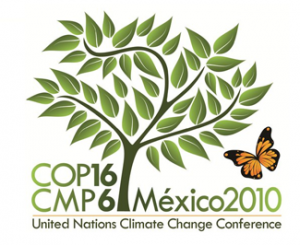COP 16 Climate Change and Agrar Solutions

Kofi Atta Annan (born 8 April 1938) is a Ghanaian diplomat who served as the seventh Secretary-General of the United Nations from 1 January 1997 to 31 December 2006. Annan and the United Nations were the co-recipients of the 2001 Nobel Peace Prize for his founding the Global AIDS and Health Fund to support developing countries in their struggle to care for their people. Read More: > HERE <
The 2010 United Nations Climate Change Conference is being held in Cancún, Mexico, from 29 November to 10 December 2010.[1] The conference is officially referred to as the 16th session of the Conference of the Parties (COP 16) to the United Nations Framework Convention on Climate Change (UNFCCC) and the 6th session of the Conference of the Parties serving as the meeting of the Parties (CMP 6) to the Kyoto Protocol.In August 2010, Ban Ki-moon stated that he doubts member states will reach a new global agreement to address global warming, but after the Tianjin talks in October Christiana Figueres, executive secretary of the UN Framework Convention on Climate Change (UNFCCC), said, „This week has got us closer to a structured set of decisions that can be agreed in Cancun … This is the greatest societal and economic transformation that the world has ever seen.“ Read More: > HERE <
AGRA www.agra-alliance.org works to achieve a food secure and prosperous Africa through the promotion of rapid, sustainable agricultural growth based on smallholder farmers. Smallholders–the majority women–produce most of Africa’s food, and do so with minimal resources and little government support. AGRA aims to ensure that smallholders have what they need to succeed: good seeds and healthy soils; access to markets, information, financing, storage and transport; and policies that provide them with comprehensive support.
Through developing Africa’s high-potential breadbasket areas, while also boosting farm productivity across more challenging environments, AGRA works to transform smallholder agriculture into a highly productive, efficient, sustainable and competitive system, and do so while protecting the environment.
www.google.com/cop15 Learn about the impacts of our changing climate, and how groups are working to cope with them.
http://www.ienearth.org Established in 1990 within the United States, IEN was formed by grassroots Indigenous peoples and individuals to address environmental and economic justice issues (EJ). IEN’s activities include building the capacity of Indigenous communities and tribal governments to develop mechanisms to protect our sacred sites, land, water, air, natural resources, health of both our people and all living things, and to build economically sustainable communities.IEN accomplishes this by maintaining an… (read more)Mission:In 1991, near the sacred Bear Butte in South Dakota, near 500 Native people came together at the outdoor 2nd Annual IEN Protecting Mother Earth gathering. At this gathering, this Unifying Principle and the Environmental Code of Ethics were written.
Mission Statement – The Indigenous Peoples of the Americas have lived for over 500 years in confrontation with an immigrant society that holds an opposing world view. As a result we are now facing an environmental crisis which threatens the survival of all natural life. In 1991, near the sacred Bear Butte in South Dakota, near 500 Native people came together at the outdoor 2nd Annual IEN Protecting Mother Earth gathering. At this gathering, this Unifying Principle and the Environmental Code of Ethics were written.
Unifying Principles – The Indigenous Peoples of the Americas have lived for over 500 years in confrontation with an immigrant society that holds an opposing world view. As a result we are now facing an environmental crisis which threatens the survival of all natural life. We believe in unified action, sharing of information, and working together with mutual respect. We recognize we must assert our sovereignty and jurisdictional rights through the application of our traditional laws and recognizing our traditional forms of leadership of our indigenous nations. We stand on principles of empowering and supporting each other to take direct, informed action and affect our ability to protect our lands from contamination and exploitation. By attempting to fulfill our responsibility to defend our mother earth we are assuring the survival of our unborn generations.The members of IEN are unified in our recognition that the traditional teachings, lifestyles, spirituality, cultures and leadership of our people as well as the survival of our future generations, are entirely dependent upon our respectful relationship with the natural world and our responsibility to the sacred principles given to us by the creator.
„SNAP-SHOT“ of environmental and economic justice issues in indigenous lands (US-CANADA): 1. Toxic contaminants, agricultural pesticides and other industrial chemicals that disproportionately impact Indigenous peoples, especially subsistence and livestock cultures.2. Inadequate governmental environment and health standards and regulations.3. Clean up of contaminated lands from mining, military, and other industry activities.4. Toxic incinerators and landfills on and near Indigenous lands.5. Inadequate solid and hazardous waste and wastewater management capacity of Indigenous communities and tribes.6. Unsustainable mining and oil development on and near Indigenous lands.7. National energy policies at the expense of the rights of Indigenous peoples.8. Climate change and global warming.9. Coal mining and coal-fired power plants resulting in mercury contamination, water depletion, destruction of sacred sites and environmental degradation.10. Uranium mining developments and struggles to obtain victim compensation to Indigenous uranium miners, millers, processors and Downwinders of past nuclear testing experiments.11. Nuclear waste dumping in Indigenous lands.12. Deforestation.13. Water rights, water quantity and privatization of water.14. Economic globalization putting stress on Indigenous peoples and local ecosystems.15. Border justice, trade agreements and transboundary waste and contamination along the US/Mexico/Canada borders and other Indigenous lands worldwide.16. Failure of the US government to fulfill its mandated responsibility to provide funding to tribes and Alaska villages to develop and implement environmental protection infrastructures.17. Backlash from US state governments giving in to the lobbying pressures of industry and corporations against the right of tribes to implement their own water and air quality standards.18. Protection of sacred, historical and cultural significant areas.19. Biological diversity and endangered species.20. Genetically modified organisms impacting the environment, traditional plants and seeds and intellectual rights of Indigenous peoples – bio-colonialism.21. Economic blackmail and lack of sustainable economic and community development resources.22. Just transition of workers and communities impacted by industry on and near Indigenous lands.23. Urban sprawl and growth on and near Indigenous lands.24. Failure of colonial governments and their programs to adequately consult with or address environmental protection, natural resource conservation, environmental health, and sacred/historical site issues affecting traditional Indigenous lands and its Indigenous peoples.25. De-colonization and symptoms of internalized oppression/racism/tribalism.26. And many others ..
Compiled by the INDIGENOUS ENVIRONMENTAL NETWORK
http://en.wikipedia.org/wiki/Kyoto_Protocol
http://en.wikipedia.org/wiki/350.org , www.350.org
- Watch the UN Climate Talks in Cancun, Mexico – LIVE www.oneclimate.net
- http://timesofindia.indiatimes.com/home/environment/global-warming
- http://www.environmentallawresource.com , http://earthjournalism.net
- http://www.indigenousclimate.org , http://www.hecac.org
- http://www.earthpeoples.org/CLIMATECHANGE/Ind.PeoplesGuide .pdf
- Articles on CLIMATE CHANGE
- Meet Indigenous Environmental Network, friends, fans at fb
- Meet Eco Walk the Talk, friends, fans at fb
- Meet International Forum on Globalization, studies, friends, fans at fb
- Meet COP 16, Cancun, studies, friends, fans at fb
- Meet 100 Million Voices for a Real Climate Deal in Mexico 2010 at fb
- Peace, Paix, 和平, Salam, Shalom, Pace, Mir, Friede, Paz, Shanti, Heiwa…
Any Action on Climate Change will affect int. Trade that bind the U.S. & more than 150 other Members of WTO. http://www.forbes.com/2009/03/24/carbon-emissions-wto-opinions-contributors-trade-war.html

http://www.3dthree.org/en/index.php , http://www.humanrightsimpact.org/
3D -> Trade – Human Rights – Equitable Economy promotes collaboration amongst trade, development and human rights professionals, to ensure that trade rules are developed and applied in ways that promote an equitable economy.
HRIA – Human rights impact assessment measures the impact of policies and interventions on human rights. The purpose of a HRIA exercise is to prevent negative effects and to maximise positive effects. This faciitates bringing human rights from theory to practice.
This paper presents an outline of key issues related to human rights impact assessments (HRIAs) of tradepolicies and agreements, based on existing literature. It offers a glimpse at existing types of HRIAs,introduces the main criteria to which HRIAs of trade agreements should respond and exposes argumentsof proponents and opponents to a human-rights based approach to assess trade policies and agreements.It is not meant to be exhaustive.
For an in-depth analysis, please refer to the bibliography enclosed.Many voices from developing countries, civil society groups and academia regularly raiseconcerns that trade liberalization and trade-related policies do not always attain the objective ofpoverty reduction and economic empowerment that they should. Also criticized is the fact thatpolicies governing economic liberalization are often formulated in a non-transparent, nonparticipatoryway, contrary to accepted human rights principles.
Economic systems need clear and predictable legal and policy frameworks to be able to workproperly and for the benefit of all. At the same time, there is mounting evidence that numeroushuman rights violations have underlying economic causes. While countries have been performingeconomic, environmental and social assessments of trade agreements for a decade,1 these have inmost cases not or only insufficiently taken into account the human rights dimension.
Thus, there is a growing demand for human right impact assessments (HRIAs) of trade policiesand agreements, coming from human rights treaty bodies,2 national parliaments,3 nongovernmentalorganizations (NGOs)4 and academics. Such calls are based on the premise thateconomic and trade policies that have been reached through inclusive processes and thatexplicitly take into account their impacts on different population groups – including the morevulnerable and marginalized – are likely to be more effective and that holding economic actorsaccountable for the impacts of their activities will contribute to more sustainable economies.
Since 1999, all European trade negotiations are systematically submitted to a sustainability impact assessment(SIA), whose list is accessible at http://ec.europa.eu/trade/issues/global/sia/studies.htm.
The United NationsEnvironmental Programme (UNEP) has also conducted several integrated impact assessments of trade agreements,see for example United Nations, Integrated Assessment of Trade Liberalization and Trade-Related Policies, UNEPCountry Studies – Round II, A Synthesis Report, United Nations Environmental Programme, Geneva and New York,2002 (Argentina, China, Ecuador, Nigeria, Senegal, Tanzania)2 Concluding Observations of the Committee on Economic, Social and Cultural Rights regarding Costa Rica, 26November 2007, E/C.12/CRI/CO/4; Concluding Observations of the Committee on the Rights of the Child regardingThailand, 27 January 2006, CRC/C/THA/CO/23 Report of the Standing Committee on International Trade, Human Rights, the Environment and Free Trade withColumbia, Communication Canada, Ottawa, June 20084 See 3D’s country reports at Human Rights Impact Assessments for Trade and Investment Agreements PDF
http://www.srfood.org/images/stories/pdf/otherdocuments/report_hria-seminar_2010_eng.pdf
http://www.3dthree.org/en/page.php?IDpage=23&IDcat=5%EF%BB%BF
http://www.humanrightsimpact.org/
http://en.wikipedia.org/wiki/Human_rights
http://www.business-humanrights.org/
http://www.sia-acp.org/acp/uk/index.php
http://ec.europa.eu/trade/analysis/sustainability-impact-assessments/
Comments are closed.